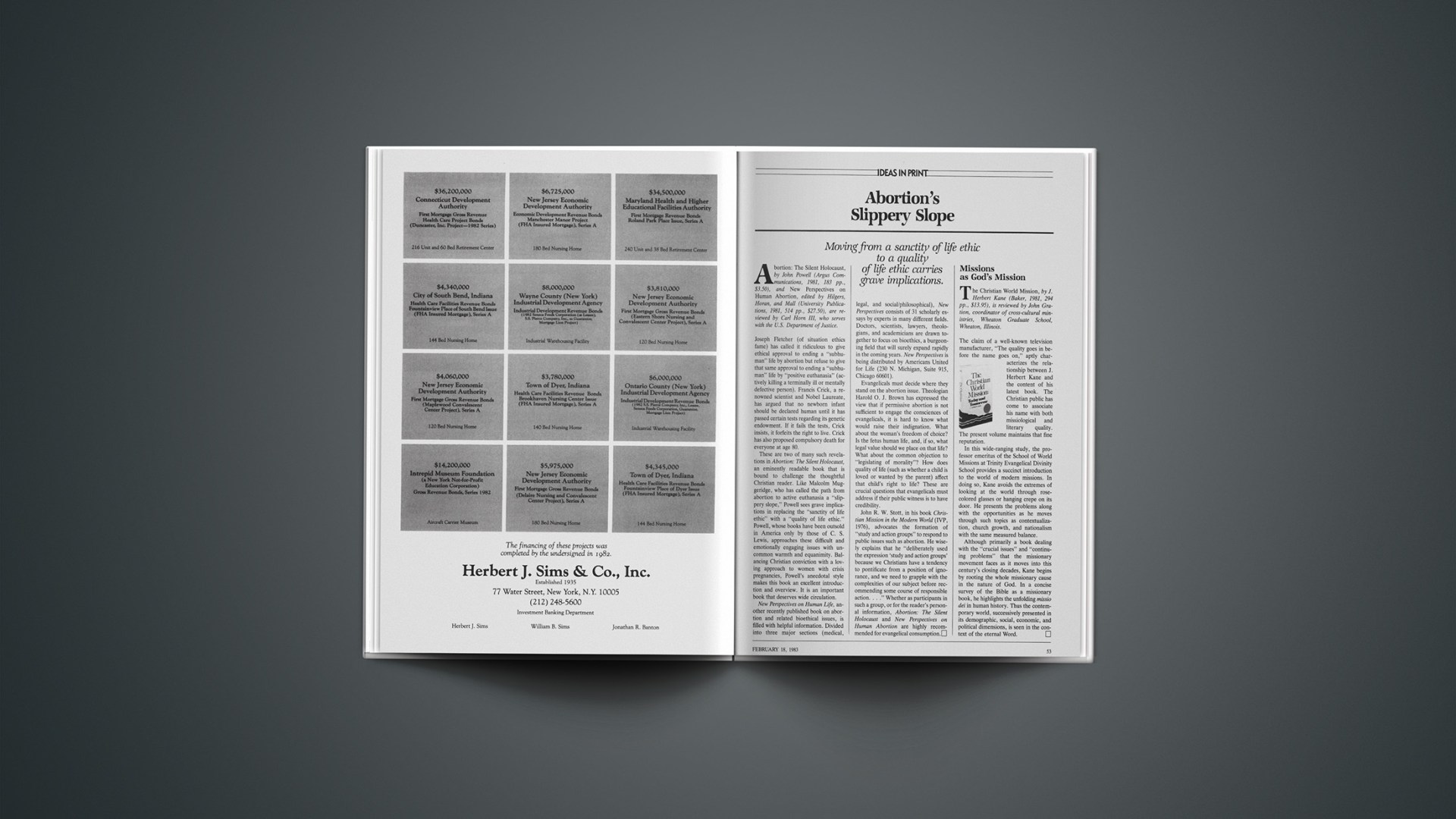Moving from a sanctity of life ethic to a quality of life ethic carries grave implications.
Abortion: The Silent Holocaust, by John Powell (Argus Communications, 1981, 183 pp., $3.50), and New Perspectives on Human Abortion, edited by Hilgers, Horan, and Mall (University Publications, 1981, 514 pp., $27.50), are reviewed by Carl Horn III, who serves with the U.S. Department of Justice.
Joseph Fletcher (of situation ethics fame) has called it ridiculous to give ethical approval to ending a “subhuman” life by abortion but refuse to give that same approval to ending a “subhuman” life by “positive euthanasia” (actively killing a terminally ill or mentally defective person). Francis Crick, a renowned scientist and Nobel Laureate, has argued that no newborn infant should be declared human until it has passed certain tests regarding its genetic endowment. If it fails the tests, Crick insists, it forfeits the right to live. Crick has also proposed compulsory death for everyone at age 80.
These are two of many such revelations in Abortion: The Silent Holocaust, an eminently readable book that is bound to challenge the thoughtful Christian reader. Like Malcolm Muggeridge, who has called the path from abortion to active euthanasia a “slippery slope,” Powell sees grave implications in replacing the “sanctity of life ethic” with a “quality of life ethic.” Powell, whose books have been outsold in America only by those of C. S. Lewis, approaches these difficult and emotionally engaging issues with uncommon warmth and equanimity. Balancing Christian conviction with a loving approach to women with crisis pregnancies, Powell’s anecdotal style makes this book an excellent introduction and overview. It is an important book that deserves wide circulation.
New Perspectives on Human Life, another recently published book on abortion and related bioethical issues, is filled with helpful information. Divided into three major sections (medical, legal, and social/philosophical), New Perspectives consists of 31 scholarly essays by experts in many different fields. Doctors, scientists, lawyers, theologians, and academicians are drawn together to focus on bioethics, a burgeoning field that will surely expand rapidly in the coming years. New Perspectives is being distributed by Americans United for Life (230 N. Michigan, Suite 915, Chicago 60601).
Evangelicals must decide where they stand on the abortion issue. Theologian Harold O. J. Brown has expressed the view that if permissive abortion is not sufficient to engage the consciences of evangelicals, it is hard to know what would raise their indignation. What about the woman’s freedom of choice? Is the fetus human life, and, if so, what legal value should we place on that life? What about the common objection to “legislating of morality”? How does quality of life (such as whether a child is loved or wanted by the parent) affect that child’s right to life? These are crucial questions that evangelicals must address if their public witness is to have credibility.
John R. W. Stott, in his book Christian Mission in the Modern World (IVP, 1976), advocates the formation of “study and action groups” to respond to public issues such as abortion. He wisely explains that he “deliberately used the expression ‘study and action groups’ because we Christians have a tendency to pontificate from a position of ignorance, and we need to grapple with the complexities of our subject before recommending some course of responsible action.…” Whether as participants in such a group, or for the reader’s personal information, Abortion: The Silent Holocaust and New Perspectives on Human Abortion are highly recommended for evangelical consumption.
Missions As God’S Mission
The Christian World Mission, by J. Herbert Kane (Baker, 1981, 294 pp., $13.95), is reviewed by John Gration, coordinator of cross-cultural ministries, Wheaton Graduate School, Wheaton, Illinois.
The claim of a well-known television manufacturer, “The quality goes in before the name goes on,” aptly characterizes the relationship between J. Herbert Kane and the content of his latest book. The Christian public has come to associate his name with both missiological and literary quality. The present volume maintains that fine reputation.
In this wide-ranging study, the professor emeritus of the School of World Missions at Trinity Evangelical Divinity School provides a succinct introduction to the world of modern missions. In doing so, Kane avoids the extremes of looking at the world through rose-colored glasses or hanging crepe on its door. He presents the problems along with the opportunities as he moves through such topics as contextualization, church growth, and nationalism with the same measured balance.
Although primarily a book dealing with the “crucial issues” and “continuing problems” that the missionary movement faces as it moves into this century’s closing decades, Kane begins by rooting the whole missionary cause in the nature of God. In a concise survey of the Bible as a missionary book, he highlights the unfolding missiodei in human history. Thus the contemporary world, successively presented in its demographic, social, economic, and political dimensions, is seen in the context of the eternal Word.










